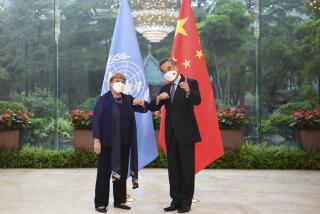West Bank Conflict Emboldens Iraqi Negotiating Team at U.N.
- Share via
UNITED NATIONS — For Saddam Hussein, the juxtaposition could not be more felicitous: As Iraq’s foreign minister arrived here Wednesday for new talks on weapons inspections, the United Nations was again embroiled in debate on the Israeli-Palestinian conflict--a conflict that Baghdad believes could provide the best possible protection from any U.S. military action.
The Iraqis want U.N. officials to provide answers to questions they posed during their last visit two months ago--20 questions, to be precise, including requests for assurances that inspectors would not be Western spies and demands for an assessment of American plans “for invading Iraq and overthrowing its national government by force.”
U.N. Secretary-General Kofi Annan was expected to tell Iraqi Foreign Minister Naji Sabri that some of his concerns can be addressed only by the Security Council. And the council has said Iraq must comply with its inspection demands before other issues are addressed.
“We are going to be discussing the implementation of Security Council resolutions, and we will discuss the return of the inspectors, but obviously there must be something on the minds of the Iraqis that they would also want to put on the table,” Annan said shortly before the talks began Wednesday. “I would hope that we can spend a considerable amount of time on the return of the inspectors.”
Hans Blix, who heads the U.N. inspection team that would be dispatched to Iraq, has been instructed to respond to technical and logistical issues raised by the Iraqis.
Among them: How long would the inspections last and would inspectors respect Iraq’s “sovereignty, independence and territorial integrity?” (Blix said the team could need up to a year and must have the right to travel freely and conduct surprise inspections anywhere in Iraq.)
Sabri was accompanied by a 15-member delegation of senior diplomats, advisors and military officers, an indication that Iraq is prepared for detailed negotiations here. Iraqi and U.N. officials in the talks declined to comment about the substance of discussions, which are scheduled to continue through Friday.
Western diplomats here are divided in their analysis of Iraq’s intentions, with some saying they believe that Baghdad is ready to readmit inspectors to forestall American military action as part of a global war on terrorism, and others doubting that Hussein would risk the discovery of the weapons of mass destruction they believe his government is hiding.
But Iraq’s sense of urgency about U.N. inspection demands appears to have diminished of late, diplomats concur.
Sabri arrived here Wednesday exuding a new confidence: At the recent Arab League summit in Lebanon, his government won unanimous opposition to U.N. sanctions, thanks to the unusual Arab solidarity provoked by Israel’s reoccupation of the West Bank. Iraq then postponed its original plans for a mid-April resumption of talks at the U.N., saying it did not want to distract attention from the Palestinian issue.
And, in what it termed a protest against U.S. support for Israel, it suspended oil sales for at least 30 days, forgoing as much as $1 billion in income.
When the Iraqis were last here in early March, they were very much on the defensive: American military threats sounded increasingly pointed and credible, the Security Council had recently endorsed a strengthened sanctions regime, and even major Arab states backed council demands that Baghdad reopen its doors to weapons inspectors.
Annan said then that his conversations would be strictly limited to securing Iraq’s fulfillment of Security Council resolutions adopted after Iraq’s 1990 invasion of Kuwait. The council imposed strict sanctions that can be lifted only if U.N. inspectors confirm that Iraq neither holds nor is trying to build chemical, biological or nuclear weapons, or missiles with the capacity to deliver the weapons beyond its borders.
A previous U.N. inspection team pulled out of Iraq in December 1998, shortly before U.S. and British warplanes launched punitive airstrikes against the country. The inspectors complained then that they had routinely been denied access to known or suspected Iraqi military installations.
“Iraq has now signaled to the secretary-general: Let’s talk about compliance,” Fred Eckhard, Annan’s spokesman, said last month after Iraq formally requested this second round of discussions. “The secretary-general is not empowered to talk about anything other than full compliance.”
But now, after being literally and diplomatically embraced by the Persian Gulf states and other Arab powers, Hussein’s envoys appear to believe that they are in a stronger negotiating position.
They say they want a comprehensive review of their entire relationship with the U.N. and are reviving requests for compensation for economic and infrastructural damage they claim is attributable to U.N. sanctions.
Annan is scheduled to meet again with the Iraqis on Friday.
More to Read
Sign up for Essential California
The most important California stories and recommendations in your inbox every morning.
You may occasionally receive promotional content from the Los Angeles Times.










